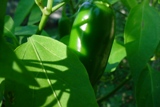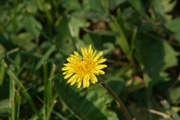Home » Literature Archives »Weeds of Thought
WEEDS OF THOUGHT
by Fa Tian Shakya
Instead of clarifying how illusory mind melts,
Illusory mind will come up again,
As though you had cut the stem of a blade of grass,
And left the root alive.
- Menzen Zuiho (1682-1769)
For the friends we left behind in the North, gardening season officially starts on Memorial Day weekend, the time when the fear that frost will damage newly planted flowers and vegetables has past. When my wife and I lived in Detroit, this was the weekend she would drag me out to a local nursery, pick out her favorite flowers, load up on garden amendments such as composted cow manure, grab a few bags of mulch, only remembering to ask if it would all fit in the back of my VW after we checked out. Driving away from the store, tailpipe practically dragging on the road, I knew that on the coming Monday I would be sore.
 Jalapeno Pepper, © Rick Gardner, 2006
Jalapeno Pepper, © Rick Gardner, 2006
I never complained - out loud that is - because I knew that any complaint I might voice would only fall on deaf ears – the same deaf ears that could never seem to hear the tires rubbing in the wheel wells of my overloaded car as we hit every little bump in the road. Truthfully though, I spent my summers working the family farm and tending my own vegetable garden, so I have a little dirt mixed in with my blood. I enjoy the moments I spend in my garden, meditating among the jalapeños. It is in these moments that I am afforded with a great opportunity to engage in a more thoughtful practice – pulling weeds.
I can only imagine what the neighbors must have thought as spring approached, and they saw me in the front yard, eyes focused on the ground a few feet in front of me, taking slow, deliberate steps, moving my way across the lawn. Like doing my own version of kinhin, I would continue in this manner until I came across a pre-emergent – aka a weed – and then I would kneel, take a hold of it, and pull it out, depositing it in an old grocery store bag; a new addition for the compost bin.
Here in the Deep South, where it turns warmer earlier, these yearly rituals have followed the weather. Our "Memorial Day planting weekend" has become our "Tax Day planting weekend." Our choice of what to plant has had to evolve as well - our favorites from Michigan don't do well in the blistering heat of the Alabama summer - but our enjoyment of the end result never withers.
 Pansy, © Rick Gardner, 2007
Pansy, © Rick Gardner, 2007
This year, however, the southeast has been in the grips of drought. Though Alabama has not experienced the wild fires that have plagued Georgia and Florida, our area is some 16 inches below our average yearly rainfall and my grass is beginning to complain. Little or no rain is forecasted for the next few weeks, but no matter how dry it gets there always seems to be enough moisture for weeds to appear in the garden and flower beds.
From clover and dandelions to spurge and wild garlic, I see them all. No matter how many times a day I wander into my garden sanctuary, I find that some weed has sprouted among the fennel or phlox. "Didn't I pull one that this morning?" I ask myself as I notice an invader. "That wasn't there a minute ago," I grumble as I see another one just a few inches away. It's as if the moment I turn my back, just as soon as I let my guard down, weeds sense my inattention and take that opportunity to sprout.
 Tomato, © Rick Gardner, 2007
Tomato, © Rick Gardner, 2007
In my years of tending to my gardens, I have learned that there is only one way to deal with weeds. Weed killer and other chemicals aren't the answer. They seem to do more damage to healthy desirable plants than to the weeds they are meant to target. No… I have to get out into the garden and down in the dirt among the flowers and the weeds. It is important that I be carefully to identify what it is that I want to keep, and what needs to be removed. But it isn't enough to just remove that part seen above the surface – the leaves and stem. I need to focus on each weed individually, digging it out, down to the very root, if I expect any real success.
How I go about weeding my garden is not all that different from how I go about my Zen practice. Proper practice doesn't involve suppression of all thought, just as I don't pull every plant that I come across. We need to be able to separate the weeds, those thoughts which are not useful, from the flowers, those which are. This point can not be understated – it makes no sense to quash every thought that arises. We risk destruction of those intuitive or insightful thoughts which may lead us to a greater understanding of ourselves.
And like weeding, proper practice doesn’t rely on "cutting off" thoughts at the surface; they'll appear again just when we think that we've controlled them. It is likely that they'll just pop up when we least expect it, and at a most inopportune time. To be really effective, we need to get to the very roots of those thoughts and pull them out and then examine them. Was the root created out of embarrassment? Did we make a mistake and get caught trying to cover it up? Or maybe the root is hurt feelings because we were rejected - by a parent, for a job, to a party, as a member? Were we jealous of someone? No matter what that root is, we have to identify it; and then, as we consider it, we have to forgive ourselves for our offenses and the people who offended us. Like a garden, every life has at least a few weeds.
Getting my hands dirty is the most important part of tending my garden. I can't get to the weeds if I spend my time sitting on the porch drinking lemonade. It isn't enough just to sit in a meditative posture once or twice a day. What we need to do is simple; just go about our daily lives, right in the midst of where those thoughts arise, and seek out their roots. With diligence and attentiveness to those moments where our "weeds of thought" appear, we can get to their very roots – which are nothing more than our anger, our greed, and our ignorance. But it's only there, down in the dirt of our lives, where we can seek them out and put an end to them.
 Dandilion, © Rick Gardner, 2007
Dandilion, © Rick Gardner, 2007
Sometimes how we look at things changes everything. I once watched an interview of a Japanese man, an auto company administrator, who had moved to the U.S. with his family. He was mowing his lawn. Was he happy to live in the U.S., he was asked. "Oh, yes," he said. "Here my family has so much room. In Japan we had a small apartment - no room for the kids to play. No green lawns. Look at this," he said, pointing with pride at his front lawn. "It's wonderful. My lawn grows these beautiful yellow flowers and when I come to them I mow around them. My neighbors think I'm crazy. They don't understand."
Fa Tian Shakya


